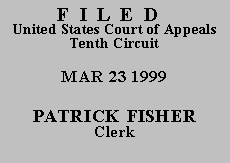

| TAURUS MALONEY, |
|
| v. | |
| DAYTON POPPEL, |
Taurus Maloney seeks leave to proceed in forma pauperis, and a certificate of appealability, in order to challenge the dismissal of his 28 U.S.C. § 2254 petition as untimely. We grant Maloney leave to proceed in forma pauperis, but because he has not made a substantial showing of the denial of a constitutional right, see 28 U.S.C. § 2253(c)(2), we deny the certificate and dismiss the petition.
Maloney's conviction was affirmed by the Oklahoma Court of Criminal Appeals on October 25, 1996. Because Maloney did not petition the United States Supreme Court for certiorari, Maloney's conviction became final 90 days later, on January 23, 1997. Maloney filed a state application for post-conviction relief in January 1998. He has maintained, without presenting any evidence, that he delivered the petition to prison authorities for mailing on January 8, 1998; it was received by the state district court on January 20, 1998. This application was denied, and the denial was affirmed on appeal by the Oklahoma Court of Criminal Appeals on May 6, 1998. Maloney claims he filed the present federal petition on May 30, 1998, by delivering it to prison authorities for mailing--a representation accepted by both the magistrate judge and the federal district court.
The district court, adopting the magistrate judge's report and recommendation over Maloney's objections, dismissed the petition as time-barred under 28 U.S.C. § 2244(d). The magistrate judge reasoned that absent tolling, Maloney had until January 23, 1998, to file his federal petition, pursuant to § 2244(d)(1)(A). The magistrate judge tolled this deadline for "[t]he time during which a properly filed application for State post-conviction . . . review with respect to the pertinent judgment . . . [was] pending." 28 U.S.C. § 2244(d)(2). Citing Lovasz v. Vaughn, 134 F.3d 146, 148 (3d Cir. 1998), the magistrate judge interpreted "properly filed" to mean properly filed according to state law. Reasoning that Oklahoma courts do not apply the prisoner mailbox rule of Houston v. Lack, 487 U.S. 266, 276 (1988), to the filing of appeals in criminal matters, the magistrate judge determined that tolling began on January 20, 1998, not on January 8, 1998, as claimed by Maloney. According to the magistrate judge's tolling calculation, Maloney had until May 9, 1998,(1) to file his petition, and therefore it was untimely.
Maloney contends that tolling should have continued for 90 days beyond May 6, 1998, because he could have petitioned the United States Supreme Court for certiorari. Maloney cites no authority apposite to this proposition, and we reject it in light of the clear statutory language of § 2244(d). Under that section, although the statute of limitations did not begin to run for Maloney until "the date on which the judgment became final by the conclusion of direct review or the expiration of the time for seeking such review," tolling occurred only for those periods "during which a properly filed application for State post-conviction or other collateral review with respect to the pertinent judgment or claim [was] pending." After May 6, 1998, no such application was pending, and, therefore, tolling stopped on that date. See Barnett v. LeMaster, No. 98-2139, 1999 WL 65081, at *1 (10th Cir. Feb. 9, 1999) (construing "pending" in § 2244(d)(2) to encompass "all of the time during which a state prisoner is attempting, through proper use of state court procedures, to exhaust state court remedies with regard to a particular post-conviction application").
We need not reach other issues to conclude that Maloney's petition was time-barred. Even if we were to toll from January 8, 1998, to May 6, 1998, that would result in a deadline of May 22, 1998, well before Maloney's May 30, 1998, filing.
Accordingly, we GRANT leave to proceed in forma pauperis, and we DENY a certificate of appealability and DISMISS the appeal.
ENTERED FOR THE COURT
Stephen H. Anderson
Circuit Judge
*.This order and judgment is not binding precedent, except under the doctrines of law of the case, res judicata, and collateral estoppel. The court generally disfavors the citation of orders and judgments; nevertheless, an order and judgment may be cited under the terms and conditions of 10th Cir. R. 36.3.
1.Although it makes no difference to Maloney's case, we believe this calculation was in error, because tolling calculations should take into account both the day tolling began and the day tolling ended. Thus, were we in all other respects to accept the magistrate judge's reasoning, Maloney's state court petition was pending for a total of 107 days, resulting in a May 10, 1998, deadline. Cf. Oklahoma Attorney General's Br. in Support of Motion to Dismiss, R. Vol. I, Doc. 9 at 2 & n.1 (arriving at the same result by different reasoning).